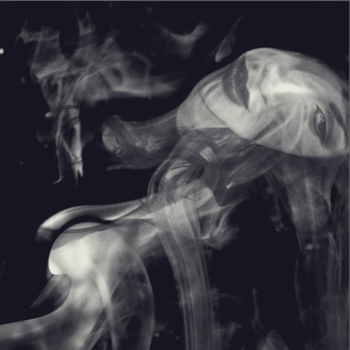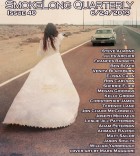How would you explain the trajectory between the first and second images, the newborn and the nurse? What’s the connection?
Probably to a large extent the connection is obvious, moving from a newborn to an obstetrics nurse, and really anything beyond that connection of idea and place can or should be brought in by the reader. I have my own feelings regarding how they fit, how the only separation in my mind between these two women or about-to-be-women is possibly time, but I’d hardly try to impose that reading on everyone. I was watching a movie called Upstream Color the other day, and it was to me a quite beautiful film about trauma, about rape specifically and what a woman does after she’s been raped, how something like sex and intimate affection in the aftermath can be devastating or actually healing. I went online, naturally, and it turns out the director has his own strict message in the film, something he says you have to come away with, but it doesn’t really match up with my own much, and, well, that kind of made me feel a little disappointed.
There seems to be an underlying theme of senses in this story, particularly color and touch. The evolving between the sub-conscious (the newborn) and the peripheries of consciousness (the nurse). Talk a bit about what was in play here.
This is just how it goes, isn’t it? Touch and taste and sight are such doorways as a child, I’d imagine even more so for a newborn who’s been cramped inside the dark for several months, but over time they start to become commonplace, we kind of know already what’s there, and the really important stuff happens just over to the left or to the right, so that if we notice it in time we feel extremely lucky, but if we miss it again that’s sort of just expected.
The last paragraph about time is notably resonant. The way it can make the same event or image grave, unbearable, and inconceivable all at once. What’s time doing in this story?
Changing things, I’d guess. Building up a complex space in the back of your head; call it memory.
Where did you grow up and who are your writing influences?
I went to high school in Florida, and though I spent many more years before that in an ostensibly more exciting place (a city, let’s say), it’s probably Florida where most of the growing happened. Influences are probably more obvious to others at this point, but I try to keep reading—I read more than I write, of course. I like everyone to some extent, but lately it’s been: Newman, McElroy, Eisenberg, some others.
Tell us about what you’re working on and how does Shadow work within that? If at all.
A bundle of stories, really, about a family that goes a little funny in the head—you know, just a little funny. It’s hardly finished, but if my preconceptions are correct then this story will be something like the first among the order, and there will be others like it—shorter bits that separate the longer bits, some of the latter quite long indeed.



 The core workshop of SmokeLong Fitness is all in writing, so you can take part from anywhere at anytime. We are excited about creating a supportive, consistent and structured environment for flash writers to work on their craft in a community. We are thrilled and proud to say that our workshop participants have won, placed, or been listed in every major flash competition. Community works.
The core workshop of SmokeLong Fitness is all in writing, so you can take part from anywhere at anytime. We are excited about creating a supportive, consistent and structured environment for flash writers to work on their craft in a community. We are thrilled and proud to say that our workshop participants have won, placed, or been listed in every major flash competition. Community works.